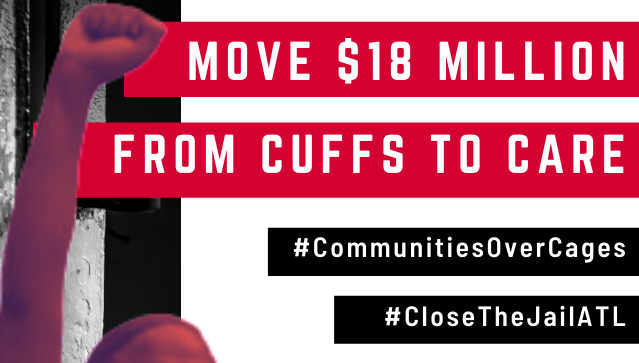From Cuffs to Care
One year ago, the Atlanta City Council voted to close the Atlanta City Detention Center (ACDC) and appointed a task force to transform the city’s ‘extra” jail into a Center for Wellness, Freedom and Equity. But as of the last meeting in April, before COVID-19 postponed planning, the city had still not agreed to a deadline to close the jail, and had begun using people detained there as a source of free labor. Now, on June 15, City Council will vote on a proposed budget allocating $18 million to ACDC, and the coalition who waged the successful moonshot campaign “Close The Jail ATL” are demanding the city follow through on their promise to divest from criminalization and invest in community restoration. The Southern Center for Human rights stands with the effort to move funding from Cuffs to Care. Please sign the petition and stand with us.

The Atlanta City Detention Center has historically served as a place to warehouse immigrants and the poor. It was erected just prior to the city of Atlanta serving as host for the 1996 Olympic Games. Beforehand – and for the duration of – the Olympics, ACDC’s population shot up from 2,200 to 4,500; at the same time, many homeless (or visibly poor) men and women disappeared from Woodruff Park. For the past 25 years, the jail has stood as a monument to the criminalization of poverty, housing increasingly smaller numbers of people arrested for offenses as minor as a broken taillight.
Marilynn Winn of Women on the Rise (WoR) and Xochitl Bervera of the Racial Justice Action Center (RAJC) head two of the nonprofit organizations behind Close The Jail ATL, the latest in a series of successful community-led campaigns for decarceral solutions in Atlanta, including Ban the Box, decriminalizing marijuana possession, municipal cash bail reform, and the history-making Pre-Arrest Diversion (PAD) initiative.
Winn’s organization, WoR, is composed of formerly incarcerated women of color. She says she believes that the people most impacted by a problem are often the ones best suited to find a solution: “Those closest to the problem are the ones… to solve those problems.”
Since ACDC was slated to close last May, a task force of 25 community members, some of whom were formerly detained at the jail, has been planning for the building’s future incarnation. Atlanta Mayor Keisha Lance Bottoms gave the group nine months to take recommendations from the community and to find new jobs for the jail’s staff. In the space formerly used to cage poor Atlantans, people would soon find resources, opportunities, and community. Winn said she envisions a welcoming space where people can connect with a variety of holistic services: “Resource centers, housing, healthcare, addiction, employment development and training, 24-hour childcare. . . Whatever it takes for a person to thrive.”
In the midst of a global pandemic, and a loss of $40 million to the City’s revenue, it is unconscionable for the City of Atlanta to waste $18 million locking people in cages for city ordinance and traffic violations, failing to deliver on the promise of community healing, and instead continuing to perpetuate violence and inequity.
“The Atlanta City Detention Center represents Atlanta’s reliance on mass incarceration and historic devaluing of Black life,” Winn and Bervera said in a statement this week, asking people to contact City Council members. “We can, in no way, allow for this jail – and potential hotspot – to exist any longer in our community, wasting desperately needed resources, criminalizing people for being poor, and making us all less safe.”